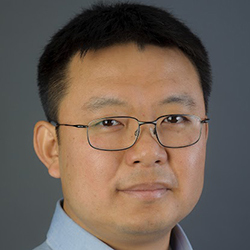Four Faculty Named to Medical and Biological Engineering Elite
Julius Lucks, Evan Scott, Hao Zhang, and Teri Odom are part of AIMBE’s College of Fellows Class of 2022
Four Northwestern Engineering professors have been elected to the American Institute for Medical and Biological Engineering’s (AIMBE) College of Fellows.

Julius Lucks, Evan Scott, Hao Zhang, and Teri Odom are among 152 engineers who make up the College of Fellows Class of 2022. They will be formally inducted during AIMBE’s 2022 Annual Event on March 25.
AIMBE’s College of Fellows comprises the top 2 percent of medical and biological engineers in the US. Fellows are recognized for their notable contributions advancing the fields of medical and biological engineering through research, practice, or education.
Lucks, professor of chemical and biological engineering, studies the molecular principles that enable biological systems to sense and adapt to changing environments and how these principles can be used to engineer synthetic biological systems that benefit humankind. A member of Northwestern’s Center for Synthetic Biology, he was elected to AIMBE for “discovering RNA folding principles related to understanding and treating disease, and engineering synthetic biology diagnostics for global health.”

Last year, Lucks developed the first-ever data-driven movies to illuminate RNA's mysterious, transformative folding process. He is also further developing a handheld platform technology, called ROSALIND, that uses a single sample to test water safety and quality – including the presence of contaminants such as lead and copper – within minutes.
Scott, Kay Davis Professor and associate professor of biomedical engineering, applies principles from biomaterials science, nanotechnology, and tissue engineering toward the development of translational immunotherapies that could support the treatment and basic understanding of heart disease, vaccination, and immune dysregulation. He was elected to AIMBE for “outstanding contributions to understanding immunological processes contributing to diverse inflammation-driven pathologies, and for therapeutic approaches using biomaterial-based strategies.”
Scott recently published research on a new type of nanotherapy that could support treatment for Type 1 diabetes.

Zhang, professor of biomedical engineering, is an expert in optical coherence tomography, single-molecular imaging, ophthalmology, vision science, and genomics. He was elected to AIMBE for “fundamental contributions to the development of visible light OCT and its translation to clinical ophthalmology.”
Zhang’s previous work includes developing a new method to conduct spectroscopic nanoscopy, an approach that could help scientists conduct single-molecule analysis to study how cells behind certain cancers, or diseases like diabetic retinopathy, function in their localized environments.
Odom, Charles E. and Emma H. Morrison Professor of Chemistry and (by courtesy) professor of materials science and engineering, is an expert in designing structured nanoscale materials that exhibit extraordinary size and shape-dependent optical properties. She was elected to AIMBE for “the development of optical nanoprobes based on anisotropic metal nanoparticles for bioimaging and therapeutics.”

Since 1991, AIMBE’s College of Fellows has worked toward for technological growth and advancement in the fields of medical and biological engineering. AIMBE Fellows have helped revolutionize medicine and related fields to enhance and extend the lives of people all over the world. Members have successfully advocated for public policies that have enabled researchers and business-makers to further the interests of engineers, teachers, scientists, clinical practitioners, and ultimately, patients.